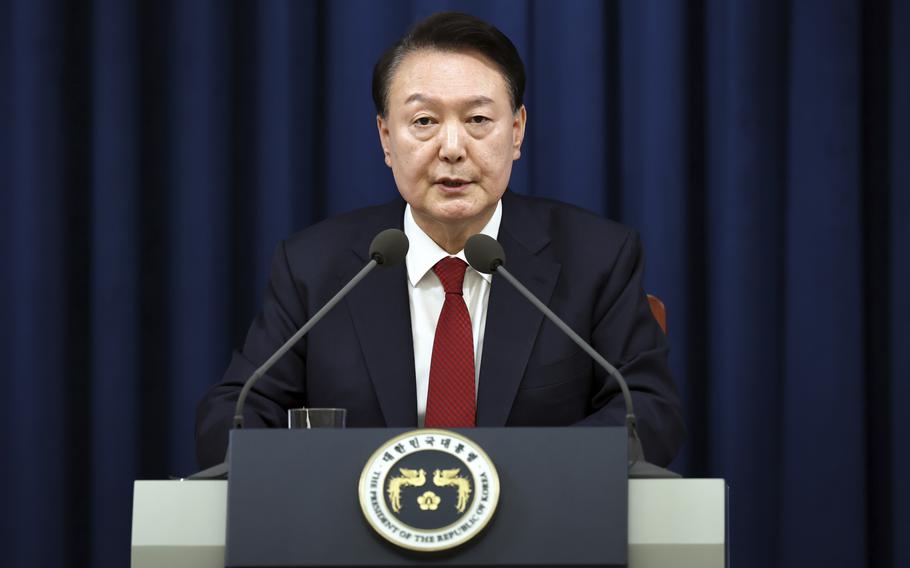
Yoon Suk Yeol speaks during a press briefing at the presidential office in Seoul, South Korea, on Dec. 3, 2024. (South Korea Unification Ministry)
CAMP HUMPHREYS, South Korea — South Korea’s Constitutional Court removed President Yoon Suk Yeol from office Friday in a decision that ends the political saga wrought by his abrupt martial law declaration four months ago.
The court unanimously upheld the National Assembly’s decision to impeach Yoon over his failed attempt Dec. 3 to impose martial law. The court ruling kicks in a requirement for a snap presidential election within 60 days.
South Korean Prime Minister Han Duck-soo, who was impeached Dec. 27 and reinstated three months later by the court, assumes presidential duties until a new president is elected.
In a televised speech immediately after the ruling, Han said he will strive to “ensure there are no disruptions” in government functions.
The eight-judge panel in Seoul found that Yoon’s martial law decree violated the country’s constitution. The panel also found Yoon obstructed the legislative process by deploying troops into the National Assembly to prevent lawmakers from reversing his order, according to a speech broadcast Friday by Acting Chief Justice Moon Hyung-bae.
Roughly 300 soldiers deployed to the National Assembly building in Seoul shortly after martial law was declared that night. Some lawmakers, aided by demonstrators, hopped fences to evade the troops and convene within hours to overrule Yoon’s decree.
Yoon has defended his decree by alleging the opposition Democratic Party was stonewalling legislation and conducting politically motivated investigations against government appointees.
Yoon’s justification for exercising emergency martial law did not pass muster, according to Moon.
“It cannot be considered that there was a crisis that could objectively justify” Yoon’s decree, Moon said Friday.
“The benefit of upholding the constitution by expelling the defendant outweighs the national loss caused by his expulsion,” he added.
Yoon was impeached by lawmakers 11 days after imposing martial law, setting the stage for the Constitutional Court to review the merits of his declaration.
Yoon was arrested Jan. 15 on insurrection charges at the presidential residence in the capital city, g the first time a sitting South Korean president was apprehended by police. He was released March 8.
In a statement through his attorneys Friday, Yoon said it was “a great honor” to have been president.
“I am very sorry and regretful that I could not live up to your expectations,” he said. “I will always pray for our beloved [South Korea] and its citizens.”
Former South Korean President Moon Jae-in, Yoon’s immediate predecessor from the Democratic Party, described the court’s verdict as having “protected the democratic republic.”
“We have once again shown the world the remarkable resilience of our democracy,” he said in a statement Friday on Facebook.